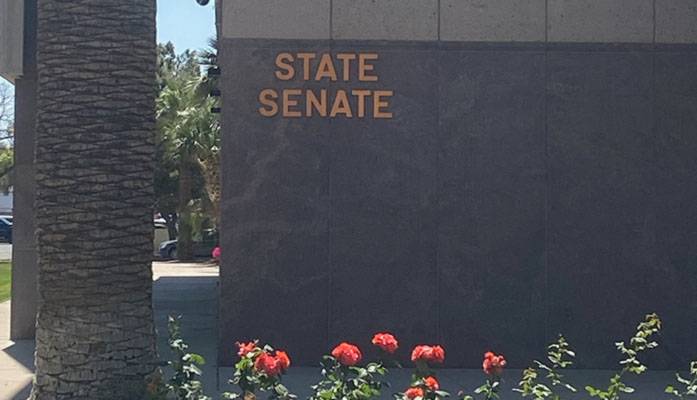
by Jonathan Eberle | May 12, 2025 | News
By Jonathan Eberle |
Despite escalating tensions between the executive and legislative branches in Arizona, the Senate Committee on Director Nominations advanced the confirmation of Robyn Sahid as Commissioner of the State Land Department during a hearing held last week.
The confirmation process continued as scheduled, even as Republican members of the committee criticized Democratic Governor Katie Hobbs over remarks she made last week. GOP lawmakers described Hobbs’ comments as an “explosive temper tantrum” and a threat to bypass the Senate’s confirmation process—a move they characterized as unlawful.
“Senate Republicans will continue to be the adults in the room and serve as the critical check and balance on the executive, as the citizens of Arizona expect of us,” said Committee Chair Sen. Jake Hoffman, referring to Hobbs’ remarks during a press gaggle. Hoffman said the governor’s comments lacked legal grounding and had no impact on the committee’s work.
Senator John Kavanagh echoed that sentiment, calling Hobbs’ statements a “meltdown,” while commending the committee’s decision to confirm Sahid. “We confirmed a competent, non-partisan, qualified individual to serve as commissioner for the State Land Department,” he said.
Sahid, who has served in multiple public sector roles, received praise from lawmakers for her qualifications and demeanor. President Pro Tempore T.J. Shope emphasized that the committee remains open to nominees who demonstrate professionalism and nonpartisanship. “Robyn Sahid fit the bill today, and she should serve as an example to Governor Hobbs of the type of individuals we are looking to advance,” Shope said.
This latest episode is part of an ongoing power struggle between Governor Hobbs and the Republican-controlled Arizona Senate over executive appointments. Since taking office in 2023, Hobbs has clashed with lawmakers over the confirmation process, at one point even withdrawing several nominees in protest of what she described as a partisan and obstructive approach by the Senate.
Arizona law requires that many agency heads appointed by the governor must be confirmed by the state Senate. Tensions have mounted as Republicans have used their majority to exert a more thorough vetting process over appointments.
Jonathan Eberle is a reporter for AZ Free News. You can send him news tips using this link.

by Jonathan Eberle | May 11, 2025 | Education, News
By Jonathan Eberle |
In a move aimed at tightening online protections for children, the Arizona House of Representatives has passed HB2112, a bipartisan bill that would require pornography websites to verify users’ ages before granting access.
The bill, introduced by Rep. Nick Kupper (R-LD25), targets commercial pornography platforms that fail to implement “reasonable” age verification systems—an approach proponents say balances child safety with user privacy. Under HB2112, companies could face civil penalties up to $250,000 if minors are able to access explicit content due to a lack of proper age checks.
“There’s no excuse for letting kids have unlimited access to hardcore pornography,” said Kupper in a press release. “HB2112 puts the responsibility where it belongs—on the companies making money off this material.”
Kupper, who serves as Vice Chair of the House Ways & Means Committee, emphasized that the bill does not store or share personal user data, a provision designed to address privacy concerns. HB2112 also gives parents the right to take civil action against companies that fail to comply.
While the bill does not replace existing parental controls, it adds what Kupper called “another layer of protection” against minors’ exposure to online pornography. “Arizona families want action, not excuses,” he said. “The Governor has a chance to do the right thing. This bill defends children’s safety and puts Arizona on the right side of a growing national effort.” The Arizona House GOP echoed the message in a social media post accompanying the announcement.
The bill has attracted support from both sides of the aisle, a notable development in a polarized legislature. If enacted, HB2112 would make Arizona one of the first Western states to adopt legally enforceable age verification requirements for adult websites.
Jonathan Eberle is a reporter for AZ Free News. You can send him news tips using this link.

by Jonathan Eberle | May 11, 2025 | News
By Jonathan Eberle |
A special legislative committee examining Arizona’s family court system will convene again Monday, May 12, as allegations of widespread abuse and violations of children’s civil rights take center stage.
State Senator Mark Finchem, chair of the Joint Legislative Ad Hoc Committee on Family Court Orders, is encouraging parents who have been negatively affected by the state’s family courts to testify during the second of five planned hearings.
According to Finchem, the committee has been inundated with stories from parents and children who say they have been mistreated or silenced by the court system. In a statement, he described the issue as not just a statewide concern, but a “nationwide crisis.”
“We expect to see over 400 people at the upcoming hearing after the traumatic stories we’ve heard and evidence we’ve seen,” Finchem said. “At this committee, we will address concerns over children’s civil rights being violated, unlicensed court-appointed medical ‘professionals’ infiltrating the system, and we will allow every voice to be heard.”
The committee’s investigation was launched following mounting complaints about Arizona’s family courts, which handle custody, divorce, and parental rights cases. Critics say the system too often fails to protect the best interests of children and allows unqualified professionals—such as court-appointed therapists or evaluators without proper licenses—to influence life-altering decisions.
The committee’s first hearing, held earlier this year, drew emotional testimony from parents alleging coercion, judicial overreach, and lack of due process. Lawmakers are using the hearings to gather testimony and evidence that could inform future legislation aimed at reforming family court procedures.
Arizona is not alone in facing scrutiny over its family courts. In recent years, states like California, Connecticut, and Georgia have also seen public outcries over custody rulings, allegations of judicial misconduct, and concerns about the lack of oversight of court-appointed professionals.
The committee will recess at noon and reconvene after the Senate and House floor sessions adjourn. Hearings are expected to continue through the summer, with three additional sessions scheduled before the end of the year.
Jonathan Eberle is a reporter for AZ Free News. You can send him news tips using this link.

by Jonathan Eberle | May 11, 2025 | News
By Jonathan Eberle |
Arizona Senate President Warren Petersen on Thursday defended the work of the Senate Committee on Director Nominations (DINO), highlighting the committee’s progress and reaffirming its role in ensuring transparency and competence in executive branch appointments.
In a statement issued from the Arizona State Capitol, Petersen said the committee — established in February 2023 and comprised of both Republican and Democratic lawmakers — is functioning as intended to uphold a constitutional check on the governor’s appointment powers.
“In an effort to establish a clear system of checks and balances over state agency directors, I created the bipartisan Senate Committee on Director Nominations (DINO),” Petersen said, noting the panel is currently led by Chairman Jake Hoffman (R) and includes Senators T.J. Shope (R), John Kavanagh (R), Flavio Bravo (D), and Analise Ortiz (D).
According to Petersen, the DINO Committee has reviewed 20 executive nominations since its creation. Of those, 14 nominees have been confirmed by the full Senate, two have been rejected, and three are pending final Senate votes. An additional seven nominations were withdrawn by the Governor’s office before hearings were held.
“The DINO Committee is working as I intended it to, and as a result, we are receiving better quality candidates from the Executive Branch to lead these state agencies,” Petersen said, adding that four nominees are currently awaiting hearings and that two new nominations are needed to replace recently withdrawn candidates.
Some Democrats and political observers have raised concerns that the panel is being used to block or delay nominees over ideological differences rather than qualifications. Petersen rejected that characterization, stating, “We are… weeding out unqualified, highly partisan, incompetent, or corrupt individuals who should not be holding any sort of leadership roles within the State of Arizona.”
In his remarks, Petersen also pushed back on public criticism of the Senate’s rejections, calling media attention to political tensions a distraction from the committee’s overall effectiveness. “The fact is we have confirmed the vast majority of the nominees,” he said. “The process is simple. If the Governor sends us qualified, non-partisan nominees, they will be confirmed.”
Governor Hobbs’ office has not yet publicly responded to Petersen’s latest remarks. Her administration has previously defended its nominees and criticized the Senate for what it describes as politicized obstruction.
Jonathan Eberle is a reporter for AZ Free News. You can send him news tips using this link.

by Matthew Holloway | May 10, 2025 | Education, News
By Matthew Holloway |
Arizona schools will be protected by more armed school campus officers, newly developed safety technology, and advanced training through a new bipartisan bill, just signed into law. The bill, HB 2074, was signed into law by Governor Katie Hobbs on Tuesday.
Sponsored by State Representative Matt Gress (R-LD4), the new law makes a massive expansion to the existing, already successful, School Safety Program and allows retired law enforcement officers to serve their communities again as school officers.
Speaking in support of the new law, Superintendent of Public Instruction Tom Horne said, “I am very pleased that this bill has become law. There is a need for more armed officers in schools and expanding the pool of available law enforcement professionals to include those who have retired in good standing is a commonsense idea that will put more officers in schools, making campuses safer. The added training and technology will increase the value of this successful program that makes our students, educators and staff safer on campus.”
“Schools must be places where all students, teachers, and staff feel safe,” said Gress in a press release. “I’m proud that this bill has been signed—crafted through collaboration with educators, certified mental health professionals, law enforcement, legislators, and Superintendent Tom Horne—into law. This marks a major step forward in implementing meaningful, commonsense school safety enhancements.”
According to a statement from the Arizona Department of Education, the new law contains provisions for Arizona schools to install new safety equipment and infrastructure. School districts and charter schools will also have access to training for safety officers on interacting with special needs students in addition to civil rights, student privacy laws, and adolescent mental issues. Each of the districts and charters must also prepare and submit a campus emergency response plan.
Matthew Holloway is a senior reporter for AZ Free News. Follow him on X for his latest stories, or email tips to Matthew@azfreenews.com.





